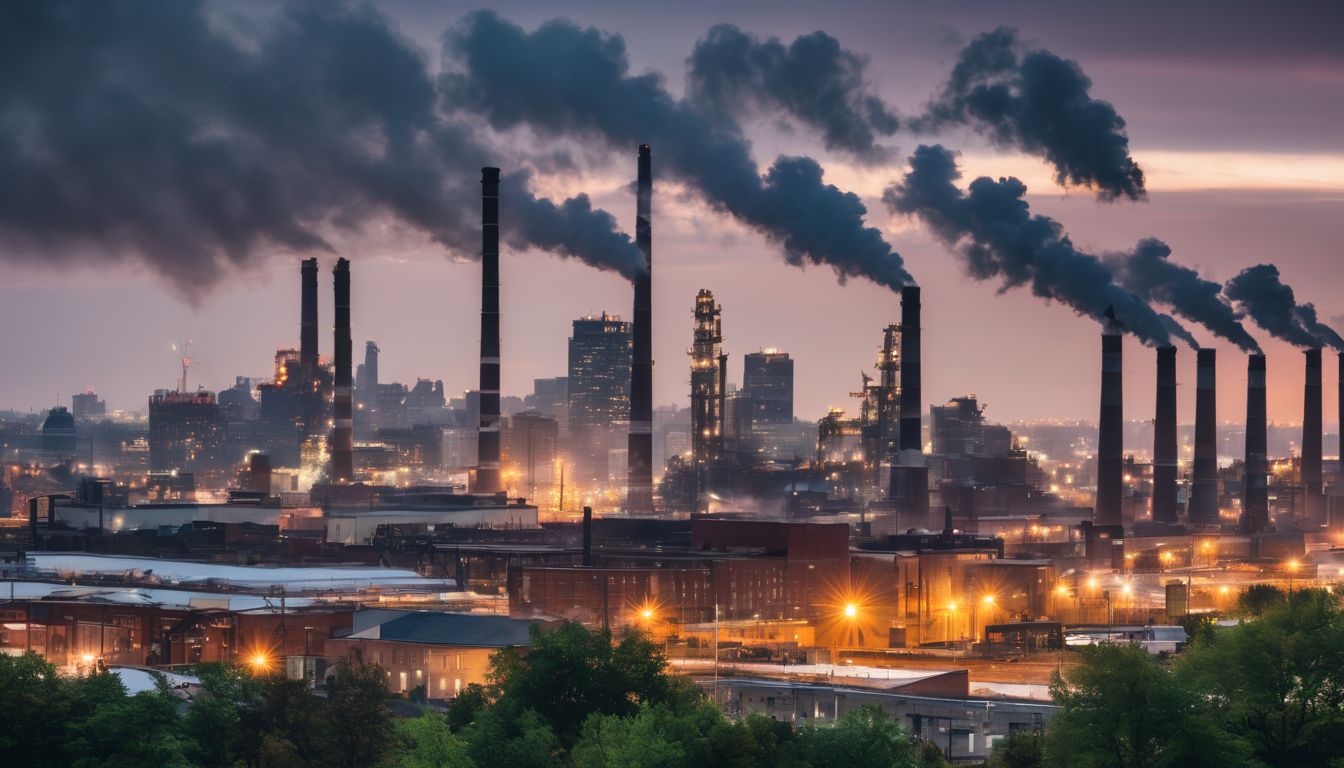Our skies are clouded by more than just weather; air pollution looms as an undeniable challenge. Each year, millions of tonnes of greenhouse gases reach our atmosphere, trapping heat and escalating global warming.
This blog unpacks the complex interplay between air pollution and climate change, offering practical solutions to a burning issue. Read on to clear the haze.
Key Takeaways
- Air pollution releases greenhouse gases that trap heat in Earth’s atmosphere, causing global warming and leading to changes in climate patterns.
- Smog, soot, wildfire smoke, pollen, and mold from air pollution deteriorate air quality and can lead to health issues like respiratory problems and cardiovascular diseases.
- Economic impacts of air pollution include high healthcare costs due to illness, loss of productivity in the workplace, and damage to infrastructure requiring expensive repairs.
- To combat these effects, we must reduce emissions by encouraging sustainable transport and increasing the use of renewable energy sources like solar and wind power.
- Supporting policies for stricter emission regulations along with improving air quality monitoring are essential steps towards protecting public health and reducing global warming. Promoting environmental justice ensures all communities have access to clean environments.
The Link Between Air Pollution and Global Warming
Greenhouse gases, such as carbon dioxide and methane, trap heat in the atmosphere, leading to an increase in global temperatures. The main causes of air pollution are industrial processes, transportation emissions, and energy production.
Greenhouse gases trap heat in the atmosphere
Greenhouse gases, including carbon dioxide and methane, act like a blanket around Earth. They allow sunlight to enter but prevent some of the heat that the sunlight brings from escaping back into space.
This trapped heat increases the planet’s temperature over time, leading to global warming.
Carbon emissions from burning fossil fuels are a major source of these heat-trapping gases. Industrial pollution and deforestation add to the levels of greenhouse gases in our atmosphere.
The result is a thicker ‘blanket’ causing temperatures worldwide to rise. Black carbon, another type of air pollutant produced by diesel engines and wood fires, also absorbs sunlight and contributes to atmospheric heating.
Causes of air pollution
The release of greenhouse gases traps heat in the atmosphere, contributing to air pollution. The causes of air pollution include:
- Emissions from vehicles and industrial activities release carbon dioxide into the atmosphere.
- Burning fossil fuels such as coal, oil, and natural gas releases pollutants like sulphur dioxide and nitrogen oxides.
- Agricultural practices involving the use of fertilisers and pesticides contribute to atmospheric pollution.
- Deforestation and land – use changes release particulate matter into the air.
- Household activities such as cooking with solid fuels can produce indoor and outdoor air pollutants.
Impacts of Air Pollution on Climate Change
Air pollution contributes to climate change by increasing temperatures, altering precipitation patterns, and causing more frequent and severe natural disasters. These impacts have far-reaching consequences for the environment, human health, and the economy.
Increased temperatures
Rising global temperatures result from the accumulation of heat-trapping gases such as carbon dioxide and methane in the atmosphere. These gases act like a blanket, preventing heat from escaping into space, leading to higher average temperatures around the world.
This increase in temperature contributes to climate change-related events such as melting ice caps, rising sea levels, and shifts in weather patterns.
As we consider the impacts of increased temperatures on our planet, it’s crucial to also understand its interconnectedness with air pollution and focus on solutions that can mitigate these effects on our environment and community.
Changes in precipitation patterns
Changes in precipitation patterns, such as altered rainfall and snowfall, are a direct consequence of air pollution driving global warming. As temperatures rise due to the increased concentration of heat-trapping gases in the atmosphere, it leads to shifts in weather patterns.
This can result in more intense and frequent extreme weather events, including heavy rainfall and prolonged droughts.
These changes have significant implications for ecosystems, agriculture, water resources, and communities around the world. Understanding these impacts is crucial for developing strategies to mitigate climate change and adapt to the changing environment.
More frequent and severe natural disasters
Changes in precipitation patterns have resulted in more frequent and severe natural disasters. Extreme weather events such as hurricanes, cyclones, and flooding are becoming increasingly common due to the impact of air pollution on global warming.
These disasters not only pose a direct threat to human lives but also lead to significant economic losses and damage to infrastructure. Environmental conservation efforts must address these challenges by mitigating air pollution and reducing greenhouse gas emissions.
More proactive measures are required to limit the intensification of natural disasters, which will help safeguard communities from the devastating impacts brought about by climate change-related phenomena.
Effects of Air Pollution on Air Quality
Air pollution leads to the formation of smog and soot, as well as an increase in wildfire smoke, pollen, and mold in the air. These pollutants can have detrimental effects on human health and the environment.
Smog and soot
Air pollution leads to the creation of smog and soot, impacting air quality. Smog forms when pollutants like nitrogen oxides and volatile organic compounds react with sunlight, leading to respiratory problems.
Soot, also known as particulate matter or PM, is made up of tiny particles from fossil fuel combustion that can cause ill health when inhaled.
Wildfire smoke can also contribute to smog and soot levels, exacerbating air quality issues. Additionally, pollen and mold spores worsen air pollution during warmer months. The detrimental effects of smog and soot highlight the urgent need for measures to reduce air pollution.
Wildfire smoke
Wildfire smoke contains harmful particles and gases that can affect the air quality over a wide area. It can exacerbate respiratory conditions and cause irritation to the eyes, nose, and throat.
Wildfire smoke also contributes to an increase in ground-level ozone, which has adverse impacts on human health. Exposure to wildfire smoke can lead to short-term health effects such as coughing, wheezing, chest pain, and difficulty breathing.
Its impact is particularly severe for vulnerable groups like children, elderly people, and individuals with pre-existing respiratory conditions.
Pollen and mold
Pollen and mould released into the air can worsen air quality, aggravate respiratory conditions, and contribute to health issues. Mold spores grow in damp indoor areas or outdoor environments while pollen comes from trees, grasses, and weeds.
These microscopic particles carry allergens that when inhaled by humans can cause allergic reactions such as sneezing, congestion, itchy eyes and throat. Furthermore, exposure to pollen and mould can exacerbate asthma symptoms or lead to respiratory infections.
Individuals who are particularly sensitive must take precautions during high pollen seasons or moist conditions. Using air purifiers at home can help reduce indoor mould spores and pollen levels.
Economic Impacts of Air Pollution
Air pollution leads to costly health expenses, decreased productivity and damage to infrastructure. To learn more about the significant economic impacts of air pollution on society, continue reading.
Health costs
The economic burden of air pollution on the healthcare system is staggering. Direct exposure to pollutants leads to a range of health issues, driving up medical expenses for individuals and governments.
| Health Issue | Cost Implications |
|---|---|
| Respiratory diseases | Increased spending on medications, hospital admissions, and long-term care |
| Cardiovascular problems | Higher costs for emergency treatment, surgeries, and rehabilitation |
| Asthma | Rising expenses for inhalers, nebulisers, and allergy treatments |
| Birth complications | Additional costs for neonatal intensive care and developmental support |
| Mental health issues | Growing demand for psychological services and therapy |
Chronic exposure worsens pre-existing conditions, necessitating ongoing medical intervention. The medical bills accumulate, adding financial strain to patients’ lives. Preventative measures and treatment for air pollution-related conditions also contribute to increasing health insurance premiums. Governments allocate substantial funds to manage the health impacts of polluted air, diverting resources from other crucial sectors. Effective strategies to reduce air pollution could alleviate these costs, fostering a more sustainable healthcare system.
Loss of productivity
The economic repercussions of air pollution extend to the loss of productivity in various sectors. Reduced worker productivity due to health issues caused by poor air quality can lead to lower output and increased absenteeism, impacting businesses, industries, and the economy as a whole.
Additionally, prolonged exposure to pollutants may result in chronic health conditions that further hinder individuals’ ability to contribute effectively in their workplaces.
Furthermore, air pollution-related illnesses not only affect individual performance but also place a strain on healthcare resources, potentially leading to higher medical costs for both individuals and governments.
Damage to infrastructure
Air pollution can lead to significant damage to infrastructure, including buildings, roads, and bridges. The presence of air pollutants such as sulfur dioxide and nitrogen oxides can corrode building materials and degrade the structural integrity of infrastructure over time.
This deterioration not only compromises safety but also requires costly repairs and maintenance. Additionally, air pollution can erode metals and concrete used in transportation systems, contributing to the degradation of roads, bridges, and other vital components of the infrastructure.
Furthermore, exposure to air pollutants accelerates the decay of building facades and monuments due to chemical reactions with the surfaces. This results in discolouration and erosion that diminishes their aesthetic value while necessitating restoration efforts.
What We Can Do
To combat the effects of air pollution on global warming, we can reduce emissions from transportation and energy production, increase the use of renewable energy, support policies to reduce air pollution, improve air quality monitoring and regulation measures, and promote environmental justice and equity.
These actions will help mitigate the impacts of air pollution on climate change and improve overall environmental health.
Reduce emissions from transportation and energy production
To reduce emissions from transportation and energy production, we can encourage the use of public transport, carpooling, biking, or walking. Furthermore, supporting the development and usage of electric vehicles will significantly decrease air pollution.
Embracing renewable energy sources like solar and wind power also lessens our reliance on fossil fuels, hence reducing harmful emissions into the atmosphere.
Taking steps to reduce emissions is crucial in combating climate change and improving air quality for present and future generations. These actions play a vital role in mitigating the effects of air pollution on global warming while promoting a healthier environment overall.
Increase use of renewable energy
Transitioning from reducing emissions to increasing the use of renewable energy is crucial for mitigating air pollution and its impact on global warming. Embracing solar, wind, and hydroelectric power will help reduce reliance on fossil fuels, lowering greenhouse gas emissions.
Encouraging the adoption of renewable energy sources through government incentives and public awareness campaigns can contribute to a cleaner environment and a sustainable future.
Shifting towards renewable energy not only reduces air pollution but also fosters innovation in clean technologies, creating green jobs and driving economic growth. Transitioning to cleaner energy sources empowers communities to take proactive measures against climate change while safeguarding the planet for future generations.
Support policies to reduce air pollution
Support policies to reduce air pollution by advocating for stricter regulations on industrial emissions and promoting the use of clean energy sources. Encourage lawmakers to implement measures that prioritise public health and environmental protection, such as investing in sustainable transportation infrastructure.
Participate in local advocacy groups and initiatives aimed at addressing air quality issues within your community, fostering a collective effort towards cleaner air for all.
By backing policies that aim to curb pollution from various sources, including factories and vehicles, we can work towards mitigating the harmful effects of air pollution on both the environment and human health.
Improve air quality monitoring and regulation measures
To combat air pollution and its impact on global warming, it is essential to enhance air quality monitoring and regulation measures. This involves implementing stricter regulations for industrial emissions, vehicle exhausts, and other sources of pollutants that contribute to poor air quality.
Additionally, investing in advanced monitoring technologies can provide real-time data on pollutant levels, enabling prompt actions to mitigate the effects of air pollution. By improving these measures, we can better protect the environment and public health while addressing the root causes of global warming.
Enhancing air quality monitoring and regulation measures will require collaboration between governments, environmental agencies, industry leaders, and communities. The integration of cutting-edge technology such as satellite monitoring systems and sensor networks can revolutionise how we track pollutants in the atmosphere.
Promote environmental justice and equity.
Promoting environmental justice and equity is crucial for addressing the disproportionate impact of air pollution on vulnerable communities. This involves advocating for fair access to clean air, water, and natural resources for all individuals, regardless of their socio-economic status or geographical location.
It also entails supporting policies that aim to reduce environmental inequalities and ensure that everyone has a voice in decision-making processes related to environmental protection.
Advocating for environmental justice and equity requires recognising the interconnectedness of social and environmental issues, as well as taking proactive steps to address systemic injustices.
Conclusion
In conclusion, air pollution significantly contributes to global warming by releasing heat-trapping gases into the atmosphere. This has adverse effects on climate change, leading to increased temperatures and more frequent natural disasters.
It also impacts air quality, causing health costs and economic losses. Taking steps to reduce emissions and increase the use of renewable energy can help mitigate these impacts and promote environmental justice and equity.
FAQs
1. How does air pollution contribute to global warming?
Air pollution releases heat-trapping gases into the atmosphere, which increase global temperatures and contribute to global warming.
2. What are some environmental impacts of air pollution on global warming?
The environmental impact includes extreme weather changes, loss of wildlife habitats, and a rise in sea levels due to melting glaciers caused by warmer temperatures from air pollution.
3. Can polluted air affect the ozone layer and how does this relate to global warming?
Yes, certain pollutants in the air can lead to ozone depletion which weakens our planet’s natural protection against harmful ultraviolet rays; this intensifies the effects of global warming.
4. Is reducing air pollution important for slowing down global warming?
Reducing air pollution is crucial because it lowers the amount of heat-trapping gases in our atmosphere, which helps slow down the rate of global warming.





